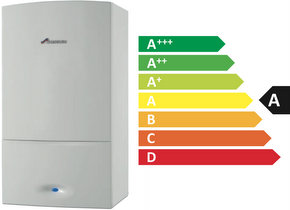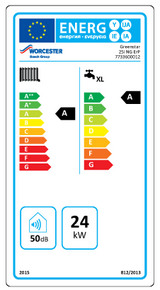
Impact of ErP directive on plumbers and installers
GUEST BLOG: Andrew Clarke – Category Manager, Heating from Graham Plumbers’ Merchant
With the ErP directive now firmly in place – having come into effect on 26th September – it’s important to make sure that installers are aware of what the new legislation means for them. Here, Andrew Clarke – Category Manager, Heating from Graham Plumbers’ Merchant looks at what the ErP directive is and what plumbers and installers must do to ensure they are compliant.
 The ErP directive has been created to help improve product efficiency, covering all heating and hot water products, up to 400kW, having been designed to help the EU achieve its target to reduce energy use by 20% and increase the share of renewable energies by 20% by 2020.
The ErP directive has been created to help improve product efficiency, covering all heating and hot water products, up to 400kW, having been designed to help the EU achieve its target to reduce energy use by 20% and increase the share of renewable energies by 20% by 2020.
Of course, now the new regulations are in place, there are different responsibilities required from manufacturers, merchants and importantly, installers. For example, under the new Energy Labelling rules, manufacturers will be responsible for providing new energy labelling for all of their products, while installers will be responsible for providing an energy label for any system they install.
This means installers will need to learn how to calculate a system’s efficiency figure, based on its different components. This system efficiency figure must then be added to a ‘package’ label to complete the installation.
Since the ErP is already in place, it is important for the installer to familiarise themselves with the overall process. Energy Labelling is the white label, seen on most washing machines and televisions for example, that outlines, by ‘band’, how efficient a product
Where just one product is installed, the installer’s obligation is to pass on the manufacturer’s Energy Label. However, when installing a complete system, it is the installer’s responsibility to provide a package label.
The process requires the production of a package document, known as a package fiche, and a package label that provides the combined system energy efficiency rating rather than the individual component ratings.
The installer’s responsibility is to provide a completed package label with every quotation to enable the consumer to make an informed choice of package. The ErP directive also covers the impact of controls on the package. These are defined using ‘classes’ – these run from Class I (an on/off room stat) right through to a Class VIII (multi sensor room control for use with modulating heating appliances). Each of these control ‘classes’ equates to a certain percentage of uplift in a system’s efficiency – for example, a Class VI weather compensating control and room thermostat can add up to 4% efficiency to the heating system.
In order to comply with the ErP directive, installers do not need to complete any additional training, but it is strongly recommended that they familiarise themselves with the changes as soon as possible – under the guidance of their local merchant if necessary – so they can be confident of the entire procedure required.
The manufacture and associated installation of heating systems that are not compliant could mean legal action is taken or even criminal prosecution for the offending manufacturer or installer, with the National Measurement Office responsible for enforcing the ErP directive itself.
Where ErP compliance is concerned, there is one area in which some leniency is allowed – if as an installer, a boiler has been purchased prior to 26th September and therefore does not contain the new ErP labelling documents in the box, it can still be sold to the customer and an energy label will not be required, since it was on the market before the date that the new ErP regulations took effect.
It is understandable that there will however be questions from installers regarding ErP regulations – in that sense, manufacturers and merchants do have a level of responsibility to uphold when it comes to providing advice and guidance. Bearing that in mind, installers are strongly urged to speak to their merchant when purchasing goods to ensure they are up to speed with exactly what’s required from them now that the ErP has been rolled out.
Latest news

27th November 2024
Russell Dean of Mitsubishi Electric on DESNZ announcement
Russell Dean, Deputy Divisional Manager at Mitsubishi Electric, discusses the package of measures announced by DESNZ last week…
Posted in Articles, Building Associations & Institutes, Building Industry News, Building Products & Structures, Building Regulations & Accreditations, Building Services, Facility Management & Building Services, Heating Systems, Controls and Management, Heating, Ventilation and Air Conditioning - HVAC, news, Pipes & Fittings, Plumbing, Sustainability & Energy Efficiency
27th November 2024
Kitsons launch new Mechanical and Electrical First Fix range
Designed to support M&E contractors, HVAC contractors and the wider Building Service market, Kitsons Technical Supplies is proud to introduce its brand new M&E First Fix range.
Posted in Air Conditioning, Articles, Building Industry News, Building Products & Structures, Building Services, Health & Safety, Heating Systems, Controls and Management, Heating, Ventilation and Air Conditioning - HVAC, Innovations & New Products, Insulation, Pipes & Fittings, Plumbing, Restoration & Refurbishment, Retrofit & Renovation, Security and Fire Protection, Walls
26th November 2024
Crown Paints supports restoration of renowned local landmark
Over the past three months, Crown Paints has supported the transformation of St. Mary’s Lighthouse, a much-loved historical landmark on the North Tyneside coast.
Posted in Articles, Building Industry News, Building Products & Structures, Case Studies, Interiors, Paints, Paints, Coatings & Finishes, Restoration & Refurbishment, Retrofit & Renovation
26th November 2024
Keller Kitchens extends carbon farming collaboration
Since 2021, DKG (parent company of Keller Kitchens and Bruynzeel) and ZLTO (association of farmers and horticulturists in the Dutch provinces Zeeland, North Brabant and South Gelderland) have been working together on a five-year pilot project – ‘Carbon Farming for CO2-storage in farmland’.
Posted in Articles, Building Associations & Institutes, Building Industry News, Building Products & Structures, Building Services, Facility Management & Building Services, Innovations & New Products, Interiors, Kitchens, Restoration & Refurbishment, Site Preparation, Sustainability & Energy Efficiency, Waste Management & Recycling
 Sign up:
Sign up: